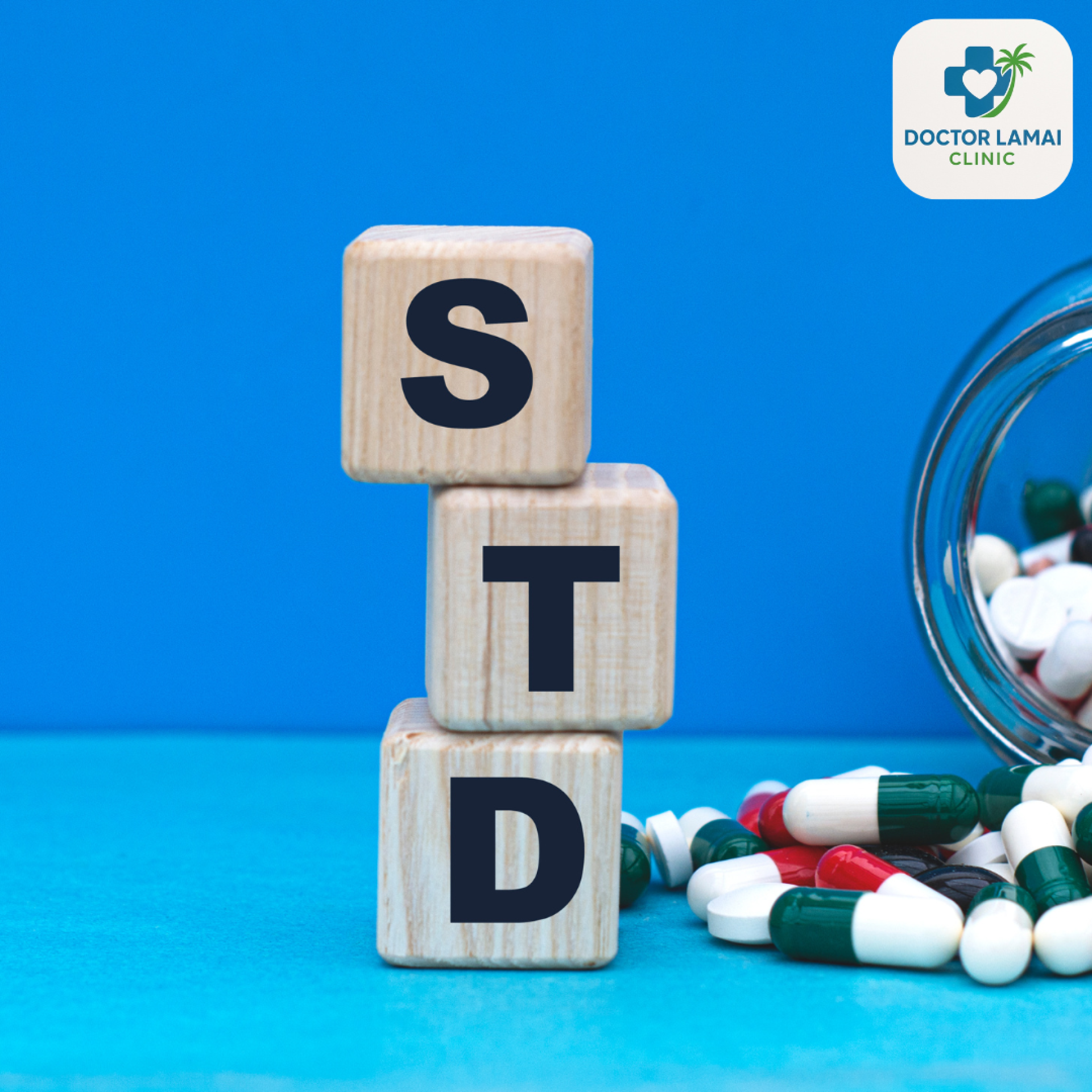STD in Koh Samui
Last updated: 15 אוג׳ 2025
22 Views

What Is An STD?
An STD is an infection that is typically passed from one person to another through sexual contact. This includes vaginal, anal, and oral sex, and sometimes through close skin-to-skin contact.
The most common STDs include chlamydia, gonorrhea, genital herpes, HIV/AIDS, pelvic inflammatory disease (PID), and human papillomavirus (HPV).
What Are The Symptoms?
Bacteria, viruses, or parasites can cause STDs, and they can have a range of symptoms. Some can be asymptomatic, meaning they might not cause any symptoms at all. This makes regular screenings and awareness crucial.
Here are a few of the most common symptoms that could indicate an STD:
-Pain or burning sensation during urination
-Lower abdominal pain
-Vaginal discharge in women
-Pain during sexual intercourse in women
-Bleeding between periods in women
-Thick, cloudy, or bloody discharge from the vagina
-Painful bowel movements
-Anal itching
-Strong vaginal odor
The Risks Of Untreated STDs
STDs, if left untreated, can result in various health complications. The extent and nature of these issues vary depending on the specific type of STD. However, there are several common risks associated with untreated sexually transmitted diseases, including:
-Increased Risk of Other Infections: Having an STD can make you more susceptible to other infections, including HIV.
-Infertility: Certain STDs, like chlamydia and gonorrhea, can cause infertility in both men and women if not treated.
-Complications During Pregnancy and Childbirth: STDs can lead to complications during pregnancy, such as ectopic pregnancy, miscarriage, and premature birth. They can also be transmitted from mother to child, causing serious health issues for the newborn.
-Pelvic Inflammatory Disease (PID): This is a serious infection of the female reproductive organs that can occur if STDs like chlamydia and gonorrhea are not treated. PID can lead to chronic pelvic pain, ectopic pregnancy, and infertility.
-Cancer: Certain STDs, like human papillomavirus (HPV), are linked to cervical, throat, and anal cancers.
-Organ Damage: Some STDs, if left untreated, can cause damage to organs like the heart and brain. Syphilis is particularly known for this.
-Systemic Infections: Untreated STDs can sometimes spread and lead to systemic infections affecting multiple body systems.
The Importance Of Testing
Because STDs can be asymptomatic and cause health complications, its essential to get testing. Regular testing becomes a crucial step in safeguarding not just your own health but also the health of your partners.
Early detection of STDs is key in managing and treating these infections effectively. By getting tested, you can promptly identify potential issues, ensuring you receive the appropriate treatment as soon as possible.
Understanding your STD status is a responsible step toward maintaining healthy sexual relationships and preventing the spread of infections to others. Remember, taking the initiative to get tested is a sign of strength and responsibility towards your health and well-being.
Talk With Us
STDs are especially important to detect during pregnancy. If you suspect you have an unplanned pregnancy, contact us at Doctor Lamai Clinic in Koh Samui WhatsApp +66 65 262 9396
An STD is an infection that is typically passed from one person to another through sexual contact. This includes vaginal, anal, and oral sex, and sometimes through close skin-to-skin contact.
The most common STDs include chlamydia, gonorrhea, genital herpes, HIV/AIDS, pelvic inflammatory disease (PID), and human papillomavirus (HPV).
What Are The Symptoms?
Bacteria, viruses, or parasites can cause STDs, and they can have a range of symptoms. Some can be asymptomatic, meaning they might not cause any symptoms at all. This makes regular screenings and awareness crucial.
Here are a few of the most common symptoms that could indicate an STD:
-Pain or burning sensation during urination
-Lower abdominal pain
-Vaginal discharge in women
-Pain during sexual intercourse in women
-Bleeding between periods in women
-Thick, cloudy, or bloody discharge from the vagina
-Painful bowel movements
-Anal itching
-Strong vaginal odor
The Risks Of Untreated STDs
STDs, if left untreated, can result in various health complications. The extent and nature of these issues vary depending on the specific type of STD. However, there are several common risks associated with untreated sexually transmitted diseases, including:
-Increased Risk of Other Infections: Having an STD can make you more susceptible to other infections, including HIV.
-Infertility: Certain STDs, like chlamydia and gonorrhea, can cause infertility in both men and women if not treated.
-Complications During Pregnancy and Childbirth: STDs can lead to complications during pregnancy, such as ectopic pregnancy, miscarriage, and premature birth. They can also be transmitted from mother to child, causing serious health issues for the newborn.
-Pelvic Inflammatory Disease (PID): This is a serious infection of the female reproductive organs that can occur if STDs like chlamydia and gonorrhea are not treated. PID can lead to chronic pelvic pain, ectopic pregnancy, and infertility.
-Cancer: Certain STDs, like human papillomavirus (HPV), are linked to cervical, throat, and anal cancers.
-Organ Damage: Some STDs, if left untreated, can cause damage to organs like the heart and brain. Syphilis is particularly known for this.
-Systemic Infections: Untreated STDs can sometimes spread and lead to systemic infections affecting multiple body systems.
The Importance Of Testing
Because STDs can be asymptomatic and cause health complications, its essential to get testing. Regular testing becomes a crucial step in safeguarding not just your own health but also the health of your partners.
Early detection of STDs is key in managing and treating these infections effectively. By getting tested, you can promptly identify potential issues, ensuring you receive the appropriate treatment as soon as possible.
Understanding your STD status is a responsible step toward maintaining healthy sexual relationships and preventing the spread of infections to others. Remember, taking the initiative to get tested is a sign of strength and responsibility towards your health and well-being.
Talk With Us
STDs are especially important to detect during pregnancy. If you suspect you have an unplanned pregnancy, contact us at Doctor Lamai Clinic in Koh Samui WhatsApp +66 65 262 9396
Related Content
Chlamydia is a sexually transmitted infection (STI) due to the bacterium Chlamydia trachomatis. It is amongst the most prevalent STIs affecting millions of people in a year. Chlamydia can spread through sexual contact such as anal, oral and vaginal sex. It is important to know how Chlamydia can be spread in order to take the necessary precautions and prevent transmission.
15 אוג׳ 2025
In this day and age, medical advancements have provided us with powerful tools to prevent HIV (Human Immunodeficiency Virus) infection: PrEP (Pre-Exposure Prophylaxis) and PEP (Post-Exposure Prophylaxis). Both medications play a crucial role in significantly reducing the risk of HIV infection, but they have different purposes and methods of use.
25 יונ׳ 2025
Explain that Candida is a type of fungus naturally found in the body but can sometimes cause health problems.
Emphasize that most people may not realize they have it until an infection occurs.
Example opening sentence
"Have you ever experienced itching, burning, or pain in your mouth or genital area without knowing why? One hidden culprit could be a fungus called Candida."
11 אוג׳ 2025



